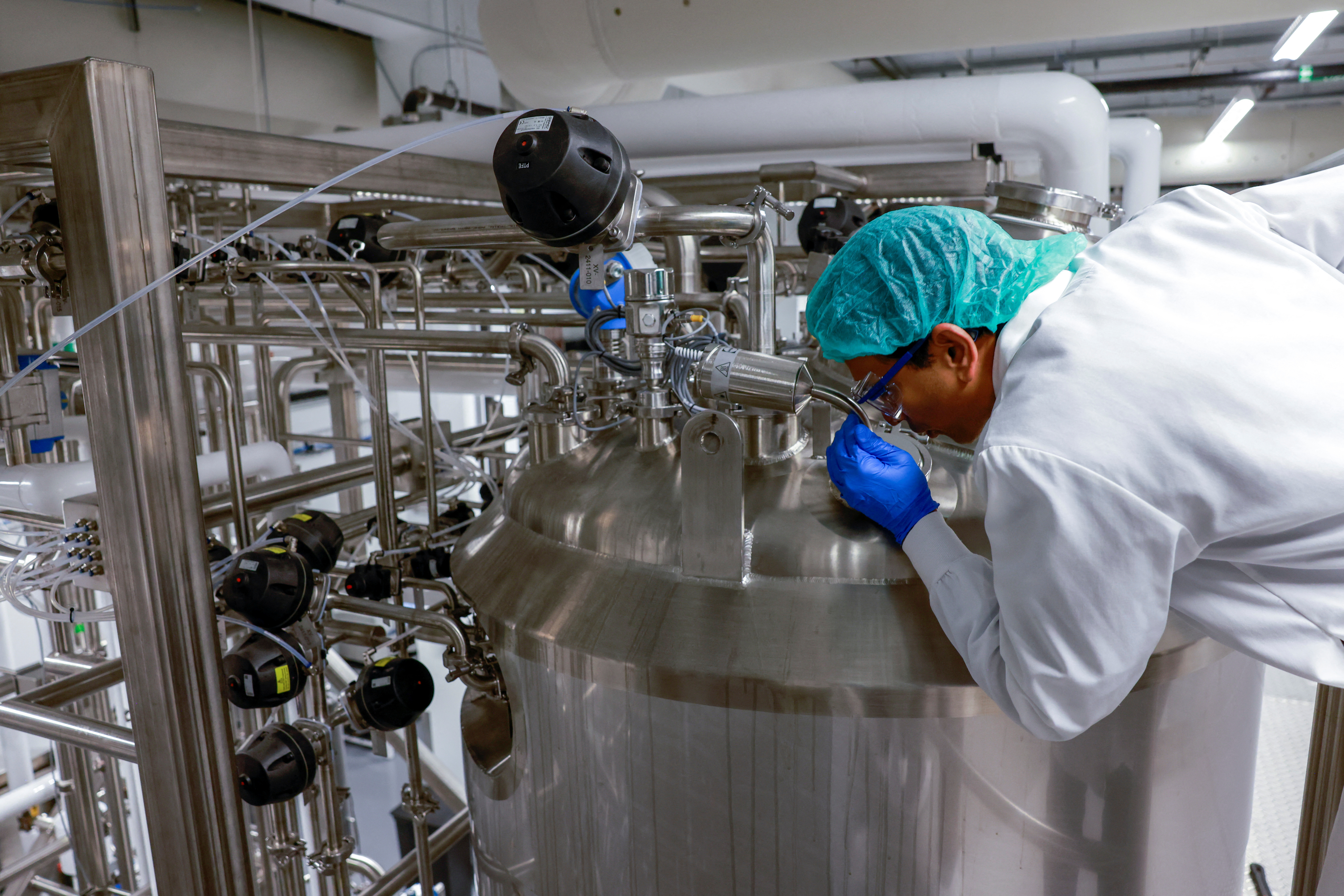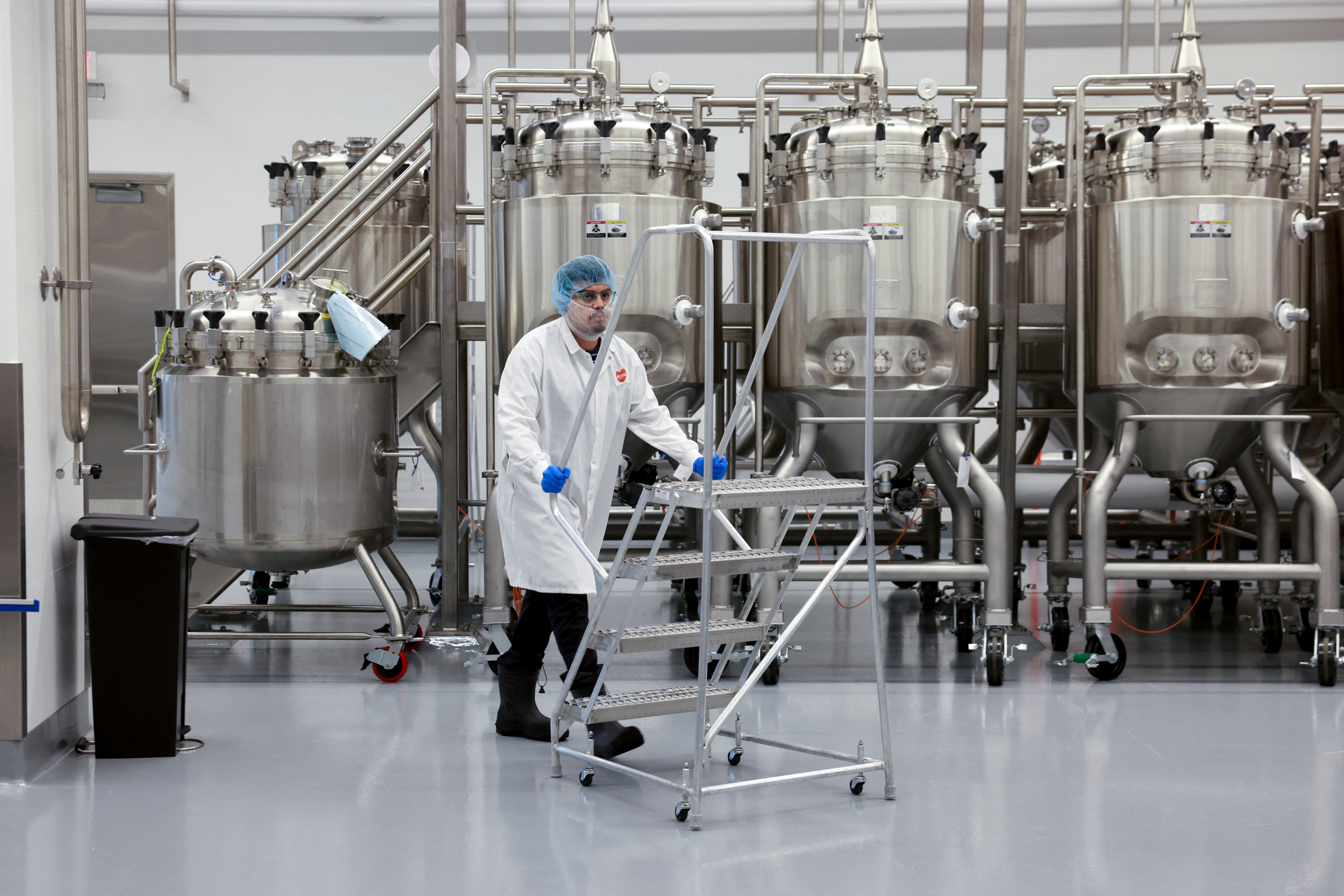Once the stuff of science fiction, lab-grown meat could become an actual reality in some restaurants in the U.S. as soon as this year.
Executives at cultivated meat companies are confident that meat grown in large steel vats could be placed on the menu within months after one company won approval from a key regulator. In a show of confidence, several of them have signed up high-end chefs like Spaniard José Andrés and Argentine Francis Mallmann to eventually showcase the meats in their high-end eateries.

But to arrive at its ultimate destination – supermarket shelves – cultivated meat faces great problems, five executives told Reuters. Companies must attract additional funding to boost production, which would allow them to offer their chicken breasts and beef steaks at a more affordable price. Along the way, they must overcome a hesitance among some consumers to even sample lab-grown meat.
Cultivated meat is obtained from a small sample of cells taken from livestock, which is then fed nutrients, grown in huge steel vessels called bioreactors, and processed into something that resembles and tastes like a real cut of meat.
Just one country, Singapore, has so far green-lighted the product for retail sale. But the United States is prepared to follow suit. The U.S. Food and Drug Administration (FDA) said in November that a cultivated meat product – a chicken breast grown by California-based UPSIDE Foods – was good for human consumption.
UPSIDE is now planning to bring its product to restaurants as early as this year and to grocery stores by 2028, its executives told Reuters.
UPSIDE still requires to be inspected by the U.S. Department of Agriculture’s Food Safety and Inspection Service and acquire sign-off from the agency on its labels. A USDA FSIS spokesperson would not comment on its inspection timeline.
`SLAUGHTERLESS HOUSE`
At UPSIDE’s facility in Emeryville, California, lab coat-clad workers were seen gazing keenly at touch screens and keeping tabs on giant vats of water mixed with nutrients during a recent Reuters visit. Meat is harvested and processed in a room that chief executive officer Uma Valeti dubs the “slaughterless house,” where it is inspected and tested.
Reuters reporters were given a sample of UPSIDE’s chicken during the visit. It tasted just like regular chicken when cooked, though was quite thinner and had a more even tan color when raw.
UPSIDE cooperated with the FDA for four years before getting the agency’s green light in November, Valeti told Reuters.
“It’s a watershed moment for the industry,” he said.
California-situated cultivated meat company GOOD Meat already has an unresolved application with the FDA, which has not been previously reported. Two other companies, Israel-based Believer Meats and Netherlands-based Mosa Meat, said they are in talks with the agency, company executives told Reuters.
The FDA would not provide details of unresolved cultivated meat applications but confirmed it is talking to many companies. Regulatory approval is just the first obstacle for making cultivated meat available to a wide swath of consumers, executives at UPSIDE, GOOD Meat, Mosa Meat, and Believer Meats, told Reuters.

The greatest challenge companies face is expanding the nascent supply chain for the nutrient mix to feed cells and for the large bioreactors needed to grow huge quantities of cultivated meat, executives said.
Now, production is limited. UPSIDE’s facility has the capacity to produce 400,000 pounds of cultivated meat per year – a small proportion of the 106 billion pounds of regular meat and poultry produced in the U.S. in 2021, based on the North American Meat Institute, a meat industry lobby group.
If the firms cannot acquire the funds required to ramp up production, their product may never get to a price point where it can vie with conventional meat, said GOOD Meat co-founder Josh Tetrick.
“Selling is different than selling a lot,” Tetrick said. “Until we as a company and other companies build large-scale infrastructure, this is going to be very small scale.”
SCALING WOES
The cultivated meat sector has so far amassed almost $2 billion in investments worldwide, according to data gathered by the Good Food Institute (GFI), a research group focused on substitutes for conventional meat.
But it will take hundreds of millions of dollars for GOOD Meat, for instance, to build bioreactors of the size required to produce its meat at a large scale, Tetrick said. Investment in the sector so far has been led by venture capital firms and major food companies like Tyson Foods Inc (TSN.N), JBS SA (JBSS3.SA), and Archer-Daniels-Midland Co (ADM.N).
JBS spokesperson Nikki Richardson said the firm’s investments in cultivated meat “are consistent with our efforts to build a diversified global food portfolio of traditional, plant-based, and alternative protein product offerings.”
Tyson failed to reply to a request for comment. ADM would not comment.
Much of that money has been channeled toward the United States, the No. 1 target for cultivated meat makers owing to its size and wealth, said Jordan Bar Am, a partner at McKinsey & Company who focuses on alternative proteins.
Some companies are ramping up U.S. production even before their products have been given a go-ahead by regulators.
Believer Meats plans to set up a facility in North Carolina, expected to be commissioned in early next year, that could churn out 22 million pounds of meat yearly, chief executive officer Nicole Johnson-Hoffman said. And GOOD Meat has plans to boost its production in California and Singapore to as much as 30 million pounds yearly.

The European Union together with Israel and other countries are also working on regulatory frameworks for cultivated meat but have not yet passed a product for human consumption.
Buy Crypto NowTHE `ICK` FACTOR
Cultivated meat companies intend to pitch to consumers that their product is greener and more ethical in contrast to conventional livestock, while attempting to deal with an aversion for their product among some shoppers.
For one, their product does not include animal slaughter, which companies expect will make the product alluring to people who abstain from meat for moral reasons. Animals are unhurt in the cell collection process, company executives told Reuters.
Another draw is that growing meat in a steel vessel rather than in a field could lower the environmental impact of livestock, which are accountable for 14.5% of the world’s greenhouse gas emissions through feed production, manure management, deforestation, and enteric fermentation – animal burps – according to the United Nations’ Food and Agriculture Organization (FAO).
Plant-based meat companies have also allured consumers with moral and environmental claims, though the sector has dominated just 1.4% of the meat market, based on a GFI report.
But cultivated meat companies have the plus that they can argue their product is real meat, Tetrick said.
“Probably the single biggest thing we’ve learned is that people really love meat. They’re probably not going to eat a whole lot less of it,” he said.
Still, a lot of people are disgusted by cultivated meat, said Janet Tomiyama, a health psychologist at the University of California, Los Angeles, who researches human diets. In a 2022 study published in the Journal of Environmental Psychology, she discovered that 35% of meat eaters and 55% of vegetarians would be too grossed out to sample cultivated meat.
Some people may consider the meat to be “unnatural” and have a negative outlook about it before even sampling it, she said.

To appeal to hesitant shoppers, companies require to be as clear as possible about how their product is produced and that it’s safe for consumption, said Tetrick, whose firm has sold its product at restaurants in Singapore.
“You’ve got to be transparent about it, but in a way that’s still appetizing,” he said.
GOOD Meat and UPSIDE Foods plan to whet American palates by unveiling their products at high-end restaurants first once given the go-ahead, they told Reuters, betting that consumers there will accept a higher price point and have a good first impression of their meat.
UPSIDE expects to introduce its products into grocery stores in the next three to five years, CEO Valeti said. Major U.S. supermarket chains failed to reply to Reuters requests for comment.
Restaurateur Andrés, recognized for his work on global food security, told Reuters he plans to sell cultivated meat owing to its environmental benefits.
“We can see in what is happening all around us, in every country around the globe, that our planet is in crisis,” he said.
Fellow chef Mallmann, widely known for his preparations of meat and other foods on outdoor flames, told Reuters he is also influenced by environmental considerations and sees the role of chefs as making the product more gastronomically appetizing and less scientific.
“We have to add romance to it,” he said.








